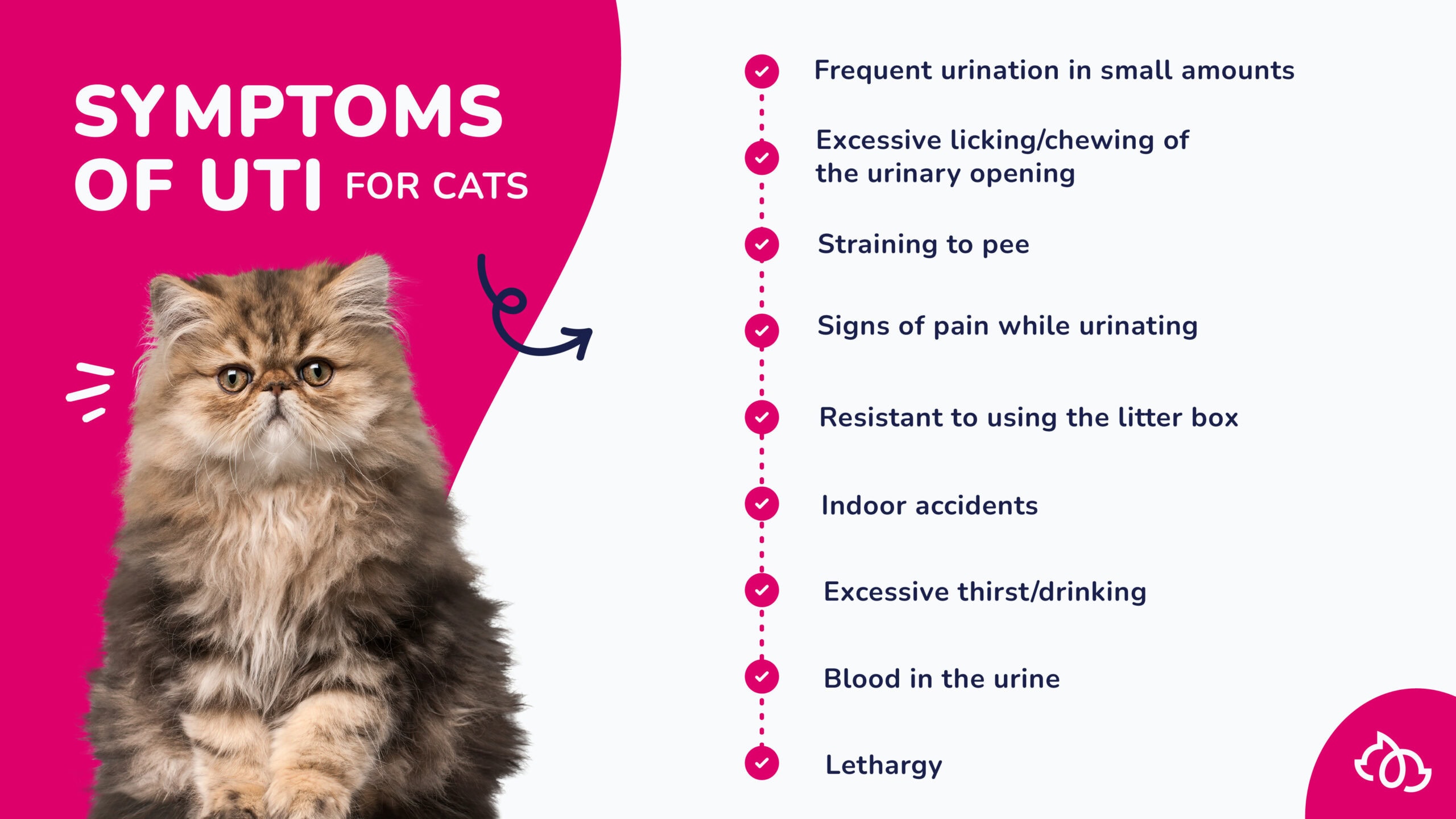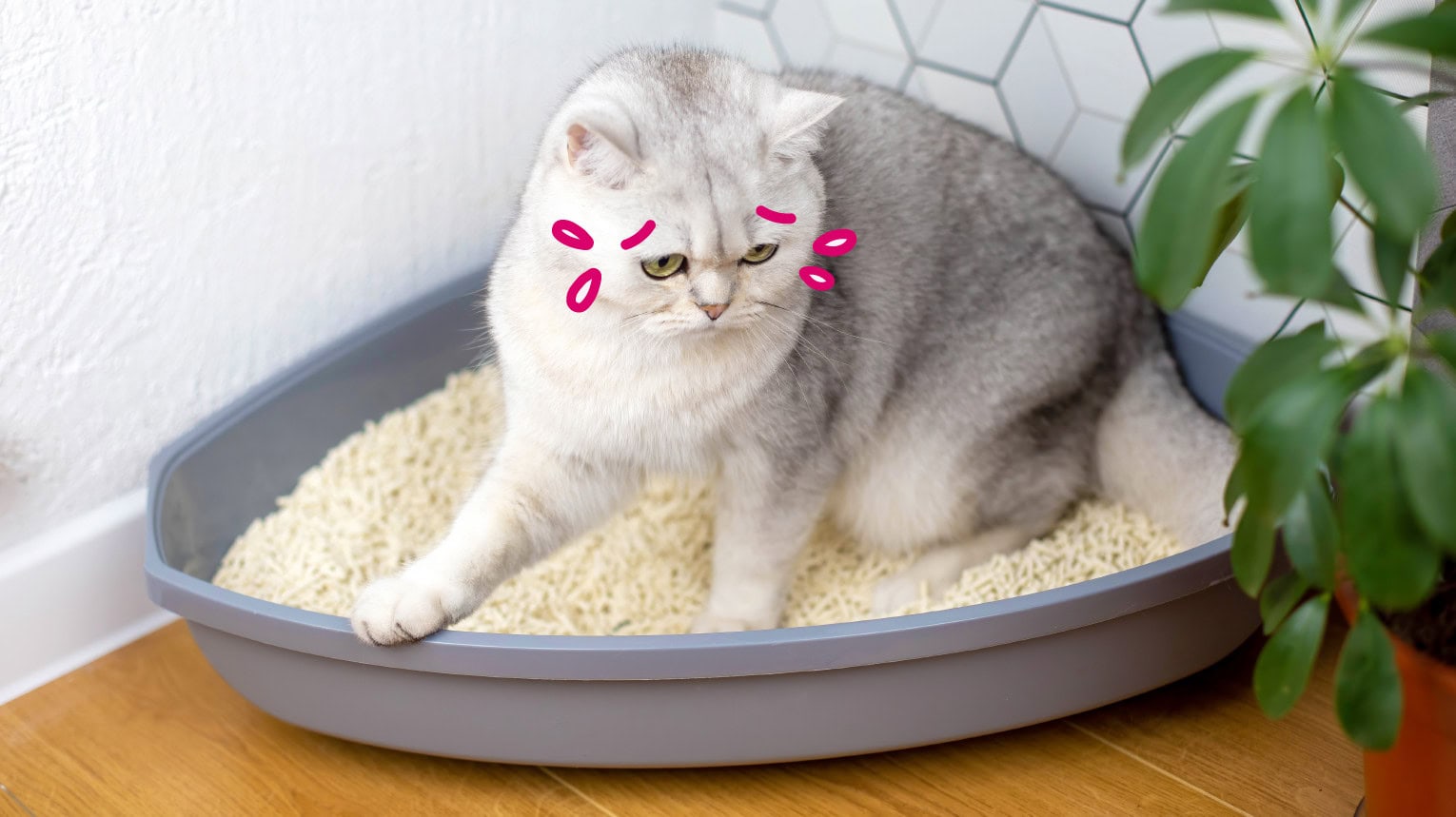Our feline friends may not be able to tell us when they’re not feeling their best, but they can offer us clues that indicate they might be suffering from a urinary tract infection (UTI).
As a veterinarian with BetterVet, I see cats with bladder infections frequently. Cat UTIs are easily treatable when caught early, but if not addressed, can lead to more serious health issues.
Signs of UTIs in Cats
If you are wondering how to tell if your cat has a UTI, some of the most common symptoms include:
- Your cat is urinating small amounts – your cat may visit the litter box more often but only produce small amounts of urine each time.
- Straining to pee – your cat may struggle or take a long time to urinate, even if they don’t produce much.
- Painful urination – your cat might seem resistant to or afraid of using the litter box and meowing or whimpering when trying to urinate.
- Urinating outside the litter box – your cat may have indoor accidents.
- Excessive licking or chewing of the genital area – your cat might be trying to relieve their discomfort by licking themselves.
- Blood in the urine – this symptom indicates a more severe condition and requires immediate veterinary attention
- In male cats, a swollen penis with or without gritty particles
- Lethargy
- Excessive thirst/drinking
- Vomiting

Causes of Cat UTIs
Several factors and conditions can lead to a cat developing a bladder infection, such as:
- Bacteria – this is the most common cause of cat UTIs and occurs when bacteria enter the urinary tract through the urethra and into the bladder.
- Stress – just like humans, stress can weaken a cat’s immune system, making them more susceptible to infections and inflammation.
- Dehydration
- Diabetes
- Defects in the lining of the bladder
- Urolithiasis – bladder stones
- Neoplasia – a tumor in the bladder or urethra
- Hyperthyroidism
- Obesity – cats who are overweight tend to develop UTIs more often
- Feline Lower Urinary Tract Disease (FLUTD) – FLUTD is a term to describe a spectrum of issues of the lower urinary tract that include infections
Diagnosing UTIs in Cats
If you suspect that your cat is suffering from UTI, don’t hesitate to contact your veterinarian so that you can begin the appropriate treatment.
With BetterVet, you can schedule an in-home visit, where we can perform thorough diagnostic tests with only a urine sample.
Some of the steps I take to diagnose cat UTIs and any related health conditions are:
- A thorough physical exam
- Urinalysis
- Urine culture
- Blood work
- X-rays
- Ultrasound
Cat Bladder Infection Treatments
As I previously mentioned, UTIs in cats are usually treatable with the right approach. The following is a list of some of the most common treatment protocols:
Medical Treatments
- Antibiotics – once the infection-causing bacteria is identified with a urine culture
- Pain management medications and anti-inflammatories
- Fluid therapy
- Treating any underlying medical conditions
Home Remedies to Improve Urinary Health
- Increasing water intake – consider a water fountain to encourage drinking
- Dietary changes – wet food is 75% moisture which improves water intake and combats dehydration
- Warm compresses – apply to your cat’s abdomen to soothe discomfort
- Stress reduction – provide a quiet, cozy place to rest, hiding spots, scratching posts and other forms of environmental enrichment
Conclusion
Early diagnosis and treatment are the keys to getting your kitty feeling like themselves again. Now that you know the signs and symptoms of UTIs in cats, you can let your veterinarian know that you suspect a bladder infection.
If you recognize the symptoms of a cat UTI or you have any concerns about your cat’s behavior or comfort level, we can come to you.
Don’t wait; schedule an in-home Sick Visit today.
Frequently Asked Questions
How long does a cat UTI last with antibiotics?
Once prescribed antibiotics to treat a urinary tract infection, your cat should be feeling much better after 2-3 days and recover completely in about 5-7 days, depending on the diagnosis. Remember to finish the full course of antibiotics that have been prescribed.
What does it mean if my cat is still peeing blood after antibiotics?
Any time there is blood in your cat’s urine could mean there is a more serious issue affecting their urinary tract. Reach out to your veterinarian immediately for the next steps.
Are UTIs contagious in cats?
No, urinary tract infections are not contagious to other cats, other pets, or humans.
Is there an at-home cat urine test to diagnose a UTI?
Yes, there are kits available for at-home testing for a cat UTI. However, because there may be an underlying health condition causing your cat’s infection, I always recommend doing so under the guidance of your veterinarian.
What are the best over-the-counter antibiotics for cats?
Because many different bacteria may be causing your cat’s infection, your veterinarian will prescribe the best one for your feline friend based on the results of the physical exam and any diagnostic testing.
Sources:
-
Bacterial Urinary Tract Infections, Merck Veterinary Manual, https://www.merckvetmanual.com/pharmacology/systemic-pharmacotherapeutics-of-the-urinary-system/bacterial-urinary-tract-infections
-
Urinary tract infection and subclinical bacteriuria in cats: A clinical update Roswitha Dorsch,* Svenja Teichmann-Knorrn, and Heidi Sjetne Lund
-
Journal of Feline Medicine and Surgery, (2019) 21, 1023–1038 URINARY TRACT INFECTION AND SUBCLINICAL BACTERIURIA IN CATS: A clinical update Roswitha Dorsch, Svenja Teichmann-Knorrn and Heidi Sjetne Lund





